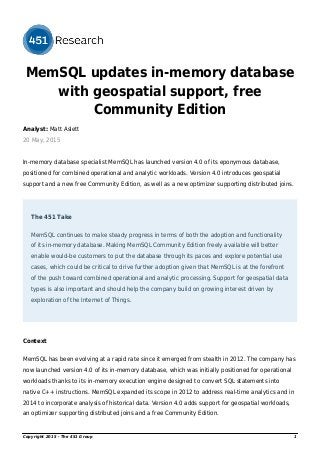
MemSQL updates in-memory database with geospatial support, free Community Edition
- 1. MemSQL updates in-memory database with geospatial support, free Community Edition Analyst: Matt Aslett 20 May, 2015 In-memory database specialist MemSQL has launched version 4.0 of its eponymous database, positioned for combined operational and analytic workloads. Version 4.0 introduces geospatial support and a new free Community Edition, as well as a new optimizer supporting distributed joins. The 451 Take MemSQL continues to make steady progress in terms of both the adoption and functionality of its in-memory database. Making MemSQL Community Edition freely available will better enable would-be customers to put the database through its paces and explore potential use cases, which could be critical to drive further adoption given that MemSQL is at the forefront of the push toward combined operational and analytic processing. Support for geospatial data types is also important and should help the company build on growing interest driven by exploration of the Internet of Things. Context MemSQL has been evolving at a rapid rate since it emerged from stealth in 2012. The company has now launched version 4.0 of its in-memory database, which was initially positioned for operational workloads thanks to its in-memory execution engine designed to convert SQL statements into native C++ instructions. MemSQL expanded its scope in 2012 to address real-time analytics and in 2014 to incorporate analysis of historical data. Version 4.0 adds support for geospatial workloads, an optimizer supporting distributed joins and a free Community Edition. Copyright 2015 - The 451 Group 1
- 2. The company says that it had always intended to make the core functionality of MemSQL available free of charge, and it has done that with MemSQL Community Edition, which has no limitations in terms of capacity and is described as production-ready. For commercial support, a user would need to upgrade to the Enterprise Edition, however, which adds a number of features to support mission-critical deployments, such as high availability, cluster replication, multiple SQL accounts and advanced security. Version 4 also includes enhancements to MemSQL's core functionality, not least a new optimizer supporting distributed joins. Also arriving, with much fanfare, is support for geospatial data types, which was previewed in March and has already been put through its paces by geographic information systems specialist Esri, which used MemSQL's support for geospatial data types and Apache Spark to analyze data from 170 million New York City taxi rides, including GPS pickup and drop-off coordinates, as well as distance and travel times. MemSQL added a multi-threaded Spark connector in February to enable users to take advantage of the open source in-memory distributed analytics engine alongside MemSQL's in-memory operational database and flash- or disk-based historical data store. The company also offers MemSQL Loader for high-performance data loading from Apache Hadoop and Amazon Web Services' S3. Additionally, the company is exploring integration with distributed infrastructure offerings such as Mesos and CoreOS. The company runs MemSQL on CoreOS internally as part of its Psyduck testing system, which runs more than 60,000 containers per day across 107 physical servers. MemSQL was founded in 2011 by two former Facebook employees: CEO Eric Frenkiel previously worked on partnership development at Facebook, while CTO Nikita Shamgunov served as a software engineer. The company now has 60 employees, compared with 40 in February 2014, and it cited more than 40 paying customers as of February 2015. The company was initially successful with online enterprises (reference customers include Zynga, Shutterstock, Comcast and CertiVox) but claims to be seeing a groundswell of interest across industries driven by emerging plans for the Internet of Things. MemSQL added In-Q-Tel as a strategic investor in September 2014 and now claims $50m in funding. Previous to that, it raised $35m in January 2014 from Accel Partners, Khosla Ventures, Data Collective and First Round Capital, which brought the total funding raised to $45m at that point. Competition Copyright 2015 - The 451 Group 2
- 3. The primary competition for MemSQL, and indeed all emerging database vendors, is the reliance on established incumbent database providers such as Oracle, IBM and Microsoft (for general-purpose workloads), as well as Teradata for analytics. There is also the assumption that it is necessary to deploy separate databases for analytic and transactional workloads, and skepticism that it is possible to run both on the same database while maintaining high performance for each. MemSQL is by no means alone in positioning for combined operational and analytic processing workloads, however. SAP has been pushing this approach heavily with its HANA database, which must also be considered a prime competitor to MemSQL thanks to being in-memory. Likewise, VoltDB is both in-memory and positioned for real-time operational and analytic workloads. The likes of Deep Information Sciences, NuoDB and JustOne Database are also targeting combined operational and analytic processing, as are NoSQL providers such as DataStax, and all take advantage of in-memory processing to some degree. SWOT Analysis Strengths Weaknesses MemSQL is differentiated thanks to its translation of SQL queries into native C++ instructions, and is at the forefront of the push toward combined operational and analytic processing. The company's plans and claims are ambitious. Reference customers continue to be key to convincing potential adopters that it can deliver. Opportunities Threats Making MemSQL Community Edition freely available will better enable would-be customers to put the database through its paces and explore potential use cases. The incumbent relational database giants are making memory-centric moves of their own, and will look to crowd out emerging specialists. Copyright 2015 - The 451 Group 3
- 4. Reproduced by permission of The 451 Group; © 2015. This report was originally published within 451 Research's Market Insight Service. For additional information on 451 Research or to apply for trial access, go to: www.451research.com Copyright 2015 - The 451 Group 4
